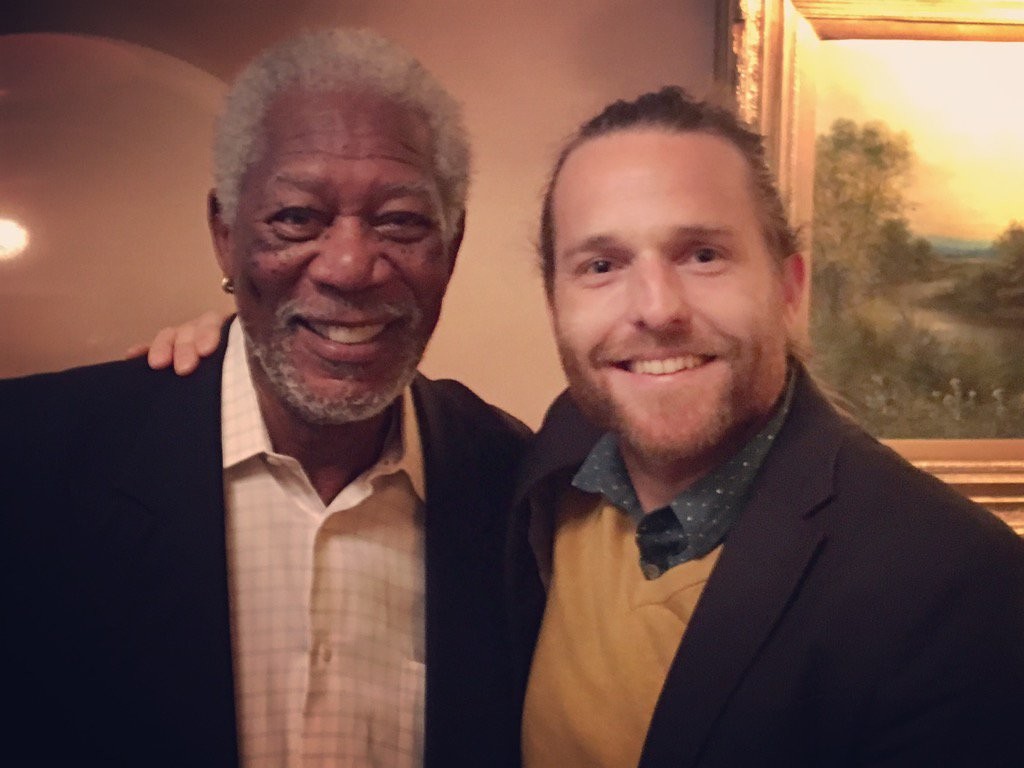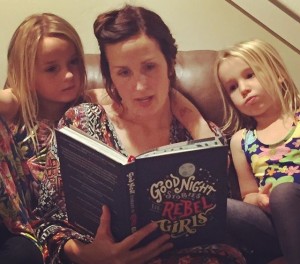 Last week I picked up Ruby, our 6-year old, from school and she immediately burst into questions about Martin Luther King Jr. A portion of our conversation went like this:
Last week I picked up Ruby, our 6-year old, from school and she immediately burst into questions about Martin Luther King Jr. A portion of our conversation went like this:
Ruby: “Daddy, did you know that white people used to not let black people drink from their water fountains or shop in their stores or ride on their buses?”
Me: “Yep, it’s terrible. How does that make you feel?”
Ruby: “Really sad. Why would people do that just because they look different?”
Me: “Because people are often scared of people who look or think different than they do. And some people think they are better because of the color of their skin.“
Ruby: “Did you hear about the man who said that we shouldn’t do that anymore? We are going to celebrate his birthday next Monday.”
Me: “Yep, his name was Martin Luther King Jr and he was a peacemaker who followed Jesus.”
Ruby: “We need to celebrate his birthday more often by doing what he said.”
I was undone. Both with pride for the way my daughter was developing and disgust at the evil of our shared history in this country.
A few days ago, some of our dear friends hosted an interactive MLK party where we read parts of his speeches, reflected on the significance of his prophetic work and witness, lamented our broken past (and present) and sang songs of hopeful protest.
Last month, I walked the streets of Montgomery, Alabama to study the history of slavery, racism and white supremacy in our country and learn from Bryan Stevenson of the Equal Justice Initiative who is actively working to heal the deep wounds in our country. As we stood in a building that once held African slaves in chains between their auctioning to the highest white, European bidder, we were invited into the history of systemic racism in the form of slavery, lynching, segregation/Jim Crow and mass incarceration.
A couple months before that, I found myself sharing and praying at the memorial service of Alfred Olango on the streets of my own city (San Diego) alongside the family of this unarmed black man killed by the police. The pain, misunderstanding and distrust was palpable.
Two years before that, like Joshua around Jericho, I marched with faith leaders in NYC after the murder of Eric Garner (who famously said, “I can’t breath,” while being choked by a police officer) pleading for God to tear down the walls of racism and injustice that hold us captive.
I’m no hero, but I feel as though I’m learning about and from those who are. Her are a few learning’s that have risen to the surface.
First, as a white man inheriting a narrative of dominance, I’ve had to confront how blind I’ve been to the plight of my friends of color and commit to a long, disorienting journey of (re)learning. Second, I’ve been deeply moved by the active nonviolent resistance put on display by black organizers for decades in pursuit of racial justice and equality. It is there that I have not only seen the actions of Jesus, but the people Jesus most often described as understanding and inhabiting the kingdom of God. And, third, I’ve been convicted and inspired to share about both – the ugly history and the beautiful peacemakers seeking to redeem it – with our children.
While my wife and I still have ALOT to learn in the parenting department, we are doing our best to stumble forward in a way that shapes our four littles in a way that reflects that of Jesus. We have found that when we expose, educate and invite our children to confront our broken past and build a new future, the act of parenting becomes a tangible form of resistance. It is resistance to perpetuating a narrative and life of apathy, privilege and violence. It is a resistance to the principalities and powers that promote the flourishing of a few at the expense of the many. At the same time, it is an opportunity to shape a generation that has learned from our mistakes and participates with God in healing our broken world.
As white parents with plenty of privilege, here are a few ways we are working to understand our parenting as resistance:
Expose Our Kids to Injustice
As a parent, there is a temptation to isolate our kids from the injustices of our world. While requiring necessary discernment, I would argue that we need to more regularly expose our kids to injustice. Not only does it allow them to confront the brokenness of our world (and the ways we’ve contributed to it) while still under our care and guidance, it gifts them with the opportunity to see a reality beyond their own. Many kids are raised embedded in systems, structures and everyday realities of injustice, so it is only in our isolated privilege that we “choose” to expose our kids to injustice. As followers of Jesus, we often see God’s best work unfolding in and among those on the underside of power. Not only was this the reality of Jesus, it was the very nature of the way he described the kingdom of God. If we don’t accompany our kids into realities of pain and suffering, they miss an opportunity to meet Jesus in the lives of those often dismissed by society at large.
Educate on the Good and the Bad
It’s easy to teach our kiddos all the good stuff of our history. Or, to twist the “bad” stuff of our past to make it sound “good.” Not only is that incomplete (or even untrue), it short-circuits their formation and perpetuates harmful narratives. In preparation for MLK Day, we read to our kids about Rosa Parks and talked about why black people were treated badly by white people. We watched Kid President who talked about MLK and the tragedy of his assassination. We opened up space for them to ask hard questions, which as a parent, is both terrifying and thrilling. If we stigmatize the hard questions as “out of bounds,” they will either ask someone else or get more curious on their own. We’re not big fans of either of those options.
Invite Them Into a Story Worth Living
We are adamant about not only helping our kids identify what they are against, but inviting them into a life that reflects what they are for. We need to invite them into story that is shaped by an enemy-loving God (Jesus) and sustained by enemy-loving people (Church). In short, we want them to identify with our global family by following a Jesus who crossed every kind of border and boundary as part of God’s mission of reconciliation. We don’t want them to be peacekeepers who embrace the status quo, but peacemakers who upset the status quo for the sake of restoring what is broken. To be “peacemakers” has now become our kiddos greatest aspiration and we talk about what that looked like for them each day on the way home from school.
This is not a time to sit on the sidelines in silence. It’s the moment we must follow Jesus into the middle of our broken story to stand with and alongside those who have been abused and sidelined in our society. For those of us with influence in and among the next generation (not only biological parents!), parenting may be both our best resistance to the evil and best opportunity to usher in the good.
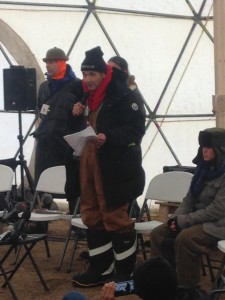 Last month, I found myself sitting in a tent listening to the Sioux tribal elders at Standing Rock reflect on the implications of the Dakota Access Pipeline halt. In arctic temperatures surrounded by domestic and international reporters, one of the elders (pic) described the tribe’s genuine celebration at the halt and proceeded to elaborate on its significance.
Last month, I found myself sitting in a tent listening to the Sioux tribal elders at Standing Rock reflect on the implications of the Dakota Access Pipeline halt. In arctic temperatures surrounded by domestic and international reporters, one of the elders (pic) described the tribe’s genuine celebration at the halt and proceeded to elaborate on its significance. Last week I picked up Ruby, our 6-year old, from school and she immediately burst into questions about Martin Luther King Jr. A portion of our conversation went like this:
Last week I picked up Ruby, our 6-year old, from school and she immediately burst into questions about Martin Luther King Jr. A portion of our conversation went like this: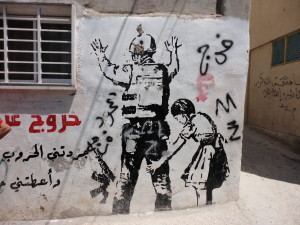 If I’m completely honest, I’ve been really discouraged as of late. A major source of my discouragement has been the way the USAmerican evangelical church (a tribe I have identified with for most of my life, so my critique and exhortation will be directed there) has chosen to engage the world in this season marked by division, violence and trauma. Now, I admit I’m speaking in generalities, but rather than being the healing balm to society’s gaping wounds, we have often contributed to the bleeding by either withdrawing in fear or adding fuel to the violence.
If I’m completely honest, I’ve been really discouraged as of late. A major source of my discouragement has been the way the USAmerican evangelical church (a tribe I have identified with for most of my life, so my critique and exhortation will be directed there) has chosen to engage the world in this season marked by division, violence and trauma. Now, I admit I’m speaking in generalities, but rather than being the healing balm to society’s gaping wounds, we have often contributed to the bleeding by either withdrawing in fear or adding fuel to the violence. 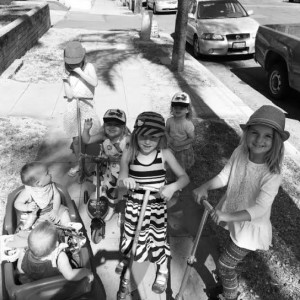 Having spent the last couple days getting solo time with my kiddos, I’ve never been more convinced that the way we raise the next generation will be our greatest contribution to healing a broken world. The stakes are high.
Having spent the last couple days getting solo time with my kiddos, I’ve never been more convinced that the way we raise the next generation will be our greatest contribution to healing a broken world. The stakes are high. 